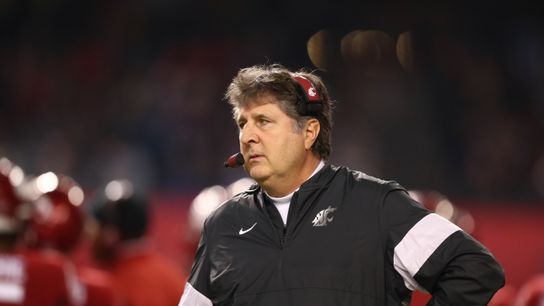Early in his podium time at SEC Media Days on Tuesday in Dallas, Missouri head coach Eliah Drinkwitz added his voice to the most popular rallying cry in college football these past 20 months.
"Coach Leach, in my mind, and I believe in most of the people in this room, is a no-doubt Hall-of-Famer," Drinkwitz said. "He impacted our game more in the last 50 years than a lot of other people, not only with his legacy, but also with his football acumen."
Where Drinkwitz differed from the other voices in the chorus is that he got specific in his charge: he called on National Football Foundation CEO Steve Hatchell specifically to get Leach in the Hall.
"I hope that Mr. Hatchell will recognize that as CEO he has the ability to utilize his discretion to make the obvious into reality, and that obvious is that the Hall of Fame is incomplete without Coach Mike Leach in it," he said.
On Thursday, the NFF addressed Leach's potential candidacy with FootballScoop, a conversation that began with the misunderstanding Drinkwitz and many others have about the Hall of Fame selection process.
For starters, Leach's winning percentage could have been .996 upon his Dec. 12, 2022 death and still would not have made the 2025 ballot, released last month. A coach must be three years removed from the game to make the ballot unless he is 70 years old, and that policy still applies posthumously. Leach was 61 at the time of his death. Under that criteria, Leach's name would not appear on the ballot until 2026, for inclusion in the 2027 class.
Furthermore, Hatchell does not control the Hall of Fame nomination process. The NFF awards committee oversees the NFF Honors Court, and the Honors Court ultimately votes nominees in or out of the Hall.
As for the other criteria... let's back up a bit.
Hatchell and NFF Chief Operating Officer Matthew Sign were hired in 2005 after years of mismanagement (full disclosure: I worked for the NFF from 2010-12), and one of their top directives from the Board of Directors was to standardize the Hall of Fame selection process. Previous leadership selected a USC player for six straight years and elected two Notre Dame players to the same class, for example.
"There was a time we probably got loose, and we were asked by our constituents -- the Board, the schools that play college football, the AFCA -- 'let's button this down.' Let's have qualifications and stick to them," Sign told FootballScoop on Thursday.
For coaches, those qualifications are that candidates must have served as a head coach for a minimum of 10 years and coached at least 100 games, be at least three years removed from the game if under 70, and win at least 60 percent of their games.
Leach died with a 158-107 record, a .596 winning percentage. A 161-107 record would have put him at .6007.
Those circumstance -- plus Leach's revolutionary influence on the game itself -- when combined with the public's ignorance of the process and the NFF's silence on the issue, has created a void since filled by outrage.
Though the NFF has hardly spoken on the issue, it has been listening. The NFF knows Leach's exclusion from the Hall is universally unpopular among the college football public.
"I get it," Sign said. "We don't have our eyes and ears closed."
However, the public doesn't decide who gets in the College Football Hall of Fame. NFF leadership and the Honors Court feels a strong conviction to stick to the rules they were told to create, and that won't change with the Pirate's passing. "You just don't change your rules and your processes on a one-off," Sign said. "That'd be a mistake no matter who it is."
The Honors Court annually discusses its criteria, and Leach's unique, tragic case has been discussed specifically. "We're not hiding from it," Sign said. "Everything gets discussed. Everybody's situation is unique."
However, the circumstances of Leach's case -- heart-breaking as they are -- will not change the criteria. The NFF will not create a Beloved active coach died with a .596 winning percentage clause, in other words. Leach's candidacy will be considered alongside other coaches commonly championed for enshrinement. "He's brought up with the others that are under .600. Are we missing anything? Should there be a shift?" Sign said.
Howard Schnellenberger's case has been cause cé·lè·bre for many since his 2011 retirement. Schnellenberger, who died in 2021, led Miami to its first national championship in 1983, legitimized Louisville as an FBS program from 1985-94, and brought Florida Atlantic's program into existence in 2001, but exited with a .511 winning percentage. His retirement and death have not changed the criteria.
"There's always the possibility of adjusting it, but it's not going to be done on a whim and not because of a group of people said it should," Sign said. "Any adjustments would be thoroughly researched and discussed."
In short, Mike Leach will not go in the College Football Hall of Fame next year, or the year after that. His name will not reach the ballot through a special exemption. But that doesn't mean Mike Leach will not one day wind up in the College Football Hall of Fame.
"It'll be a healthy dialogue and I think that's a good thing for the entire process. This is not anti-Mike Leach," Sign said. "I want people discussing it and I'm glad they do."
As always, stay tuned to The Scoop for the latest.
